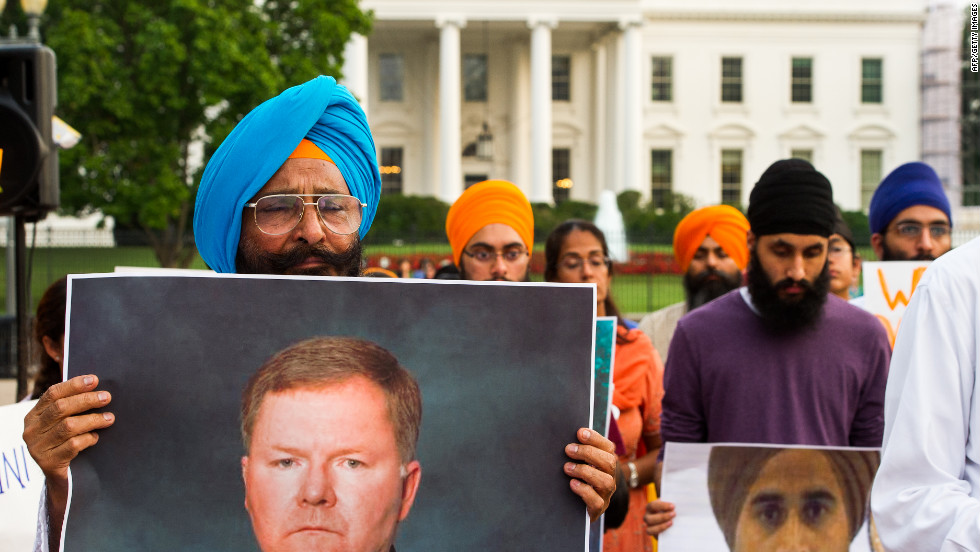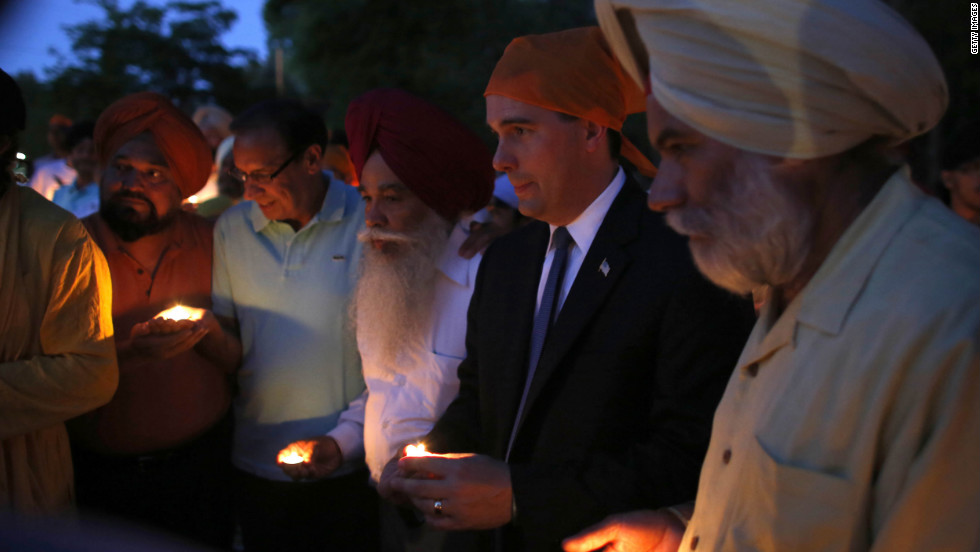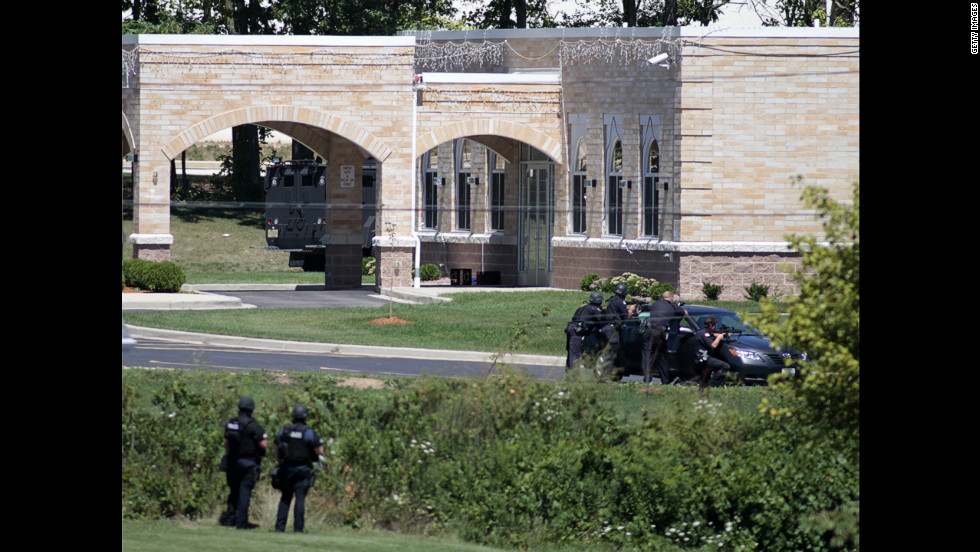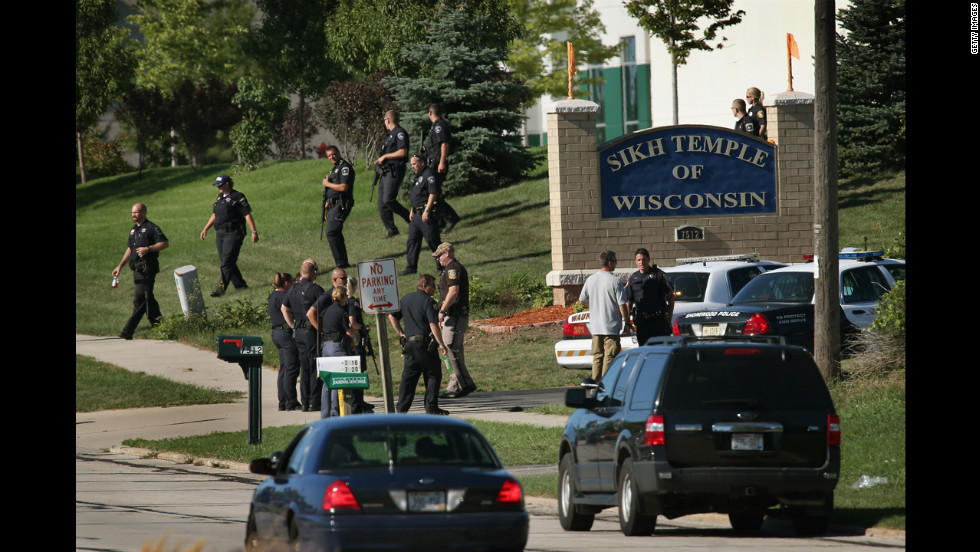Story highlights
- Sons of woman killed: 'She lived for us'
- Satwant Singh Kaleka was a hero, his son says
- Vigils held at Sikh temple, other locations
- Victim Suveg Singh educated others about his religion
Several years ago, Satwant Singh Kaleka put a large American flag in the front of his yard, raising the eyebrows of his children, who thought it might be considered an eyesore.
Kaleka pointed out there were no homes nearby with flags, and he wanted to show that the United States was a land of opportunity, said his son, Amardeep Kaleka.
The elder Kaleka, 65, served as president of the Sikh temple in Oak Creek, Milwaukee, scene of Sunday morning's mass shooting. He was one of six community members killed.
"He lived the American dream," Amardeep Kaleka told CNN. His father brought his family to the United States with little money but a strong work ethic in the early 1980s. The flag also was a form of protection for the family, Satwant Kaleka told them.
It stood at half-staff Monday evening as the family grieved.
The six killed in Sunday's attack were identified by police as five men -- Kaleka; Sita Singh, 41; Ranjit Singh, 49; Prakash Singh, 39, and Suveg Singh, 84 -- and a woman, 41-year-old Paramjit Kaur.
"She was a good woman. She was a great mom," said Kaur's son, Harpreet Saini, 18.
Kaur and her family immigrated to the United States eight years ago.
"She lived for us. She worked for us. Anything she did, it was for us," said her older son Kamal Saini, 20. "If there wasn't enough to eat it was always us before she ate."
When Kaur was in the temple praying on Sunday, "My aunt told her that there was a shooting going on outside, we need to get up and leave," said Kamal Saini. "Rather than just getting up and leaving, she wanted to just bow down and pray for the last time and then get up and leave. She was just getting up. She was shot in the back."
Her dream was for her sons to be educated. "She told us education is everything here," said Kamal Saini.
His mother's death "took my world away," he said.
Both young men plan to pursue careers in law enforcement. "I wanted her to see me in uniform," Kamal Saini said.
Another victim, Suveg Singh, spent every day at the temple, said his granddaughter, Sandeep Khattra.
"He is always there, and he's with the community and anybody who is willing to listen," said Khattra. "He educated them about our religion."
The victim's family told CNN they will return to their temple. His son, Baljander Singh Khattra, said Suveg Singh was friendly and a "very strong person."
Prakash Singh was a priest who recently immigrated to the United States with his wife and two young children, said Justice Singh Khalsa, a temple member since the 1990s.
Amardeep Kaleka said people called to tell him that his father saved many lives Sunday.
The son said he was not surprised his father tried to stop the gunman at a Sikh temple in Wisconsin.
"It's an amazing act of heroism, but it's also exactly who he was," Amardeep Kaleka told CNN Milwaukee affiliate WTMJ. "There was no way in God's green Earth that he would allow somebody to come in and do that without trying his best to stop it."
Amardeep Kaleka said the FBI told him his father attacked the shooter in the lobby, resulting in a "blood struggle." A knife close to the victim's body showed blood on it, he said.
"From what we understand, he basically fought to the very end and suffered gunshot wounds while trying to take down the gunman," said Kanwardeep Singh Kaleka, Satwant's nephew.
Satwant Kaleka's wife, Satpal, hid with several other women, telling them to remain quiet during the horrific incident.
The gunman came into the kitchen and shot and wounded two women, she told CNN. "I grabbed everybody and said run, run to the pantry."
Amardeep Kaleka said his father worked hard and was an honest man.
"I would love for them (the public) to know that he lived his life with the principles that he knew and he was taught at a young age. It made him highly successful in America."
President Barack Obama signed a proclamation honoring the victims, ordering that U.S. flags be flown at half-staff at federal facilities and buildings.
Vigils were held Monday night, and one is set for Tuesday. The Sikh temple in Brookfield, northwest of Oak Creek, was to hold a candlelight vigil late Monday.
The Rev. Paul Armstrong of Oak Creek Community United Methodist Church, site of a Monday evening prayer vigil, said the diverse array of faiths in the community have an opportunity to further deepen bonds. "There's a few of us who will be calling folks together to organize some more interfaith services," he told CNN.
"Being in mission to the world is something we share," Armstrong said of his faith and the Sikh community. "Their hospitality is wonderful. That is something the Christian community is called to do."
The vigil was held outdoors, and a survivor of the temple shooting spoke, according to Armstrong.
"The focus was to express our sorrow and that all of us can be lights of the world," he said.
Navdeep Singh, a policy adviser to the Sikh American Legal Defense and Education Fund, says Sikhs believe in freedom of religion, community service and inclusiveness. At temples, or gurdwaras, where Sikhs hold services, everyone is welcome.
"You can come and be equal," he says.


































































